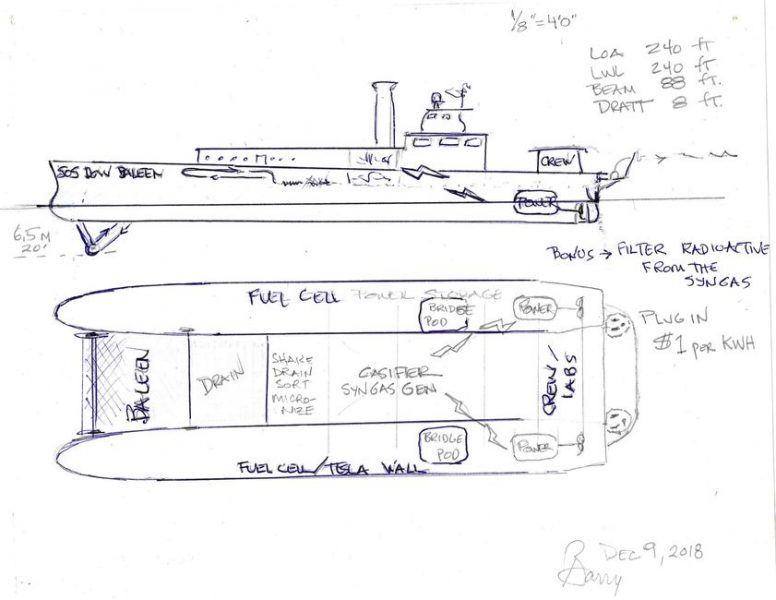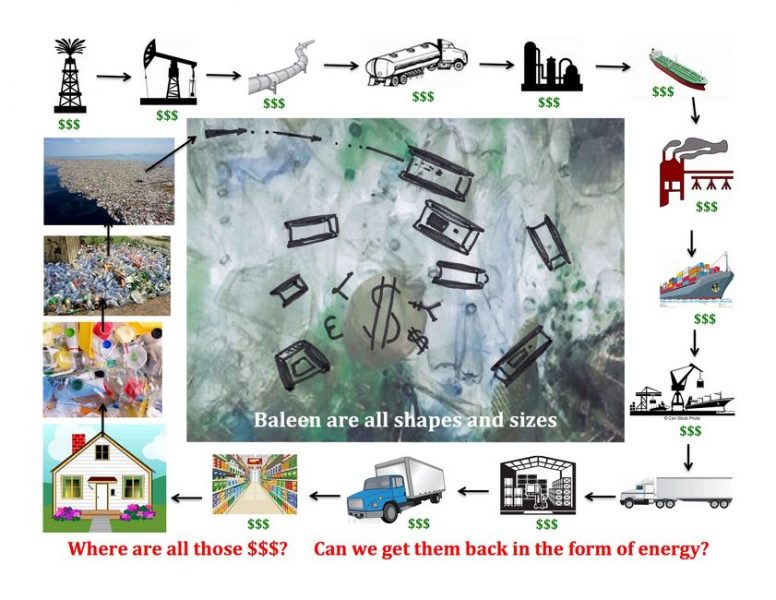
Barry’s Baleen Will Scour the Sea
When we first met him, Barry Spanier exuded passion about all things sailing and the ocean. A Bay Area native, Spanier sailed out the Golden Gate in 1975, went on to cruise the South Pacific, shipwreck, live in the jungle in Tahiti, forge a friendship with Bernard Moitessier, and eventually settle in Maui, where he became one of the most sought-after windsurfing sailmakers. Spanier is currently building the Rosie G — a unique cruiser that he’s been mulling over for decades — at Berkeley Marine Center under the expert eye of master boatbuilder Cree Partridge.
Spanier also has his sights set on one of the most pressing environmental issues of our time: plastics in the ocean. Spanier conceived of a boat called the “Baleen” (also known as Ships that Scour the Sea), named after filter-feeder whales.

“The ships [would] function as laboratory stations, observation posts and for teaching experience,” Spanier wrote on his website, pondering the positive side effects that building the ‘scourers’ could have. “Rebuilding the steel industry. Rebuilding ship building. Employing thousands. Crew service is equivalent to military. We know youth are desperate to be working at something meaningful to humanity and the planet. In full swing, there are 250 ships, each costing $50 million or less. Fifty ships scour each known gyre following coordinated GPS guidance.”
When we met up with Spanier at BMC back in April, he said, “Baleen is where my big intention is now. We can do this. Shit, Larry Ellison could do it with pocket change.”
Spanier believes that the boats can effectively power themselves with the trash they collect, given advancements in plastic to diesel technology. “Gasification converts one ton of matter into one megawatt of power,” Spanier wrote. “This runs the ship systems and power train. With battery storage walls or hydrogen fuel cells, it can store power for other electric vessels.”
On his website, Spanier mused on the vicious cycle of plastic, money and waste: “Where do the dollars come from? Where do they go? Oil comes out of the ground. It costs money to get oil out and sell it for money. It’s pumped by derricks at a cost to make money. Someone built that pipeline with money to move oil, to the trucks that cost money to move the oil, to the refinery that makes money by producing the raw materials for plastic, to the tanker ship that makes money moving the purified oil, to the plastics factory that makes money making things out of the oil, to the container ship that makes money moving the plastic goods, to the ports that cost money to transfer the shipments, to the semi-trucks that cost money to haul the plastic, to the warehouse that charges money to handle the plastic, to the delivery truck that charges money to get the plastic to the retail store, to the money exchange of the household . . . All outward, to the garbage — no money, just cost of hauling the garbage — if there is such a thing in the third-world places, to the river where the plastic flows with the river to the sea. It accumulates in giant masses of trillions of tons of waste.” We’ll have more on some of the different — and often competing — ideas for cleaning up the ocean, and preventing trash from getting there in the first place, in the July issue of Latitude 38.
We’ll have more on some of the different — and often competing — ideas for cleaning up the ocean, and preventing trash from getting there in the first place, in the July issue of Latitude 38.

thanks, tim. it is so important that the idea reaches as far as possible. it’s all simple using currently available technology. all that’s lacking now is will to do it and money. i would even downward revise the 50MM$ estimate. might be closer to half that and if there was some sort of ‘liberty ship’ style program, could even be lower.
let’s do this.
aloha
barry
Aloha Barry –
Liberty ship analogy quite apt. Requires same level of effort. Baleen boats are fantastic idea – more feasible than Ocean Cleanup project.
Best of luck!
Denise de Joseph
Former research coordinator at Algalita Marine Research & Education
I believe that besides the ocean going versions there should be the river versions around the world and start to clean up before it dumps into Oceans and Seas . Thanks for your great project. Newcomb Barger